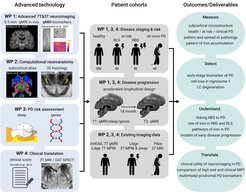IronSleep
Early stage neuroimaging and behavioral biomarkers of PD progression and underlying mechanisms

General Information
Parkinson disease is a slowly developing pathology, affecting brains decades before the first motor symptoms become noticeable. Small structures in the midbrain are irreversibly damaged, when PD is first diagnosed, making a cure currently impossible. Early detection of PD pathology is therefore indispensable to develop clinical approaches going beyond symptom treatment. IronSleep aims to detect early stages of PD by combining precise sleep diagnostics and recent breakthroughs in non-invasive Magnetic Resonance Imaging (MRI). We will explore the damage to small brainstem structures regulating sleep that happens much earlier in the disease progression than brain structures responsible for movement control. Advanced MRI can detect subtle changes in the very small brain structures. Combining sleep recording and MRI will boost diagnostic power for early PD detection and will help us to understand disease progression at early disease stages, enabling the development of new therapeutic methods.
The goals of IronSleep could only be reached with active participation of patients. Apart from recruiting PD, RBD and RLS patients to participate in the study, we will actively reach out to patients for help and consulting in establishing and optimizing neuroimaging protocols and scanning procedures, with an emphasis on optimal patient comfort to achieve best quality neuroimaging data, central goal for IronSleep.

Source slider image WP3 ULiège: © iStock.com/Elen11






